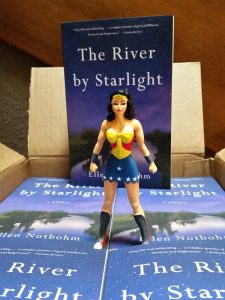A Different Kind Of Wonder Woman
 It was an odd stocking stuffer—a five-inch Wonder Woman, with Gumby-esque limbs malleable enough to achieve super-human, joint-defying positions. I tossed my husband a baffled look. No fan of the superhero, superpower stuff, I’ve always found my power in the ordinary, the everyday, the quiet people and deeds.
It was an odd stocking stuffer—a five-inch Wonder Woman, with Gumby-esque limbs malleable enough to achieve super-human, joint-defying positions. I tossed my husband a baffled look. No fan of the superhero, superpower stuff, I’ve always found my power in the ordinary, the everyday, the quiet people and deeds.
“But you have been a Wonder Woman, writing this book,” he said, referring to my decade-long work on my novel The River by Starlight, a historical tale based on true events. “Your tenacity, your curiosity, your patience. Your tirelessness.”
Wonder Woman.
When our son was young and communication-delayed, our speech therapist taught me to help him develop social-emotional thinking by reading books together and pausing before turning the pages to say “I wonder?” I wonder what’s going to happen next? I wonder what she’s going to say? I wonder what he’s feeling? I wonder why they did that? The therapist called this approach “a picture walk” through books. Instead of reading the words, my son and I tried to figure out what was going on and what was going to happen only by “I wonder”-ing about the pictures.
I found myself doing the same thing with period photos from the settings of my novel. I wonder how he got that scar? I wonder why she looks so worried? I wonder how much that thresher cost and what they had to scrimp on get it? I wonder how her feet feel after walking two miles in those shoes? I wonder how much—how little—of that moonshine it took to render him knee-walking drunk?
And where I could find no pictures, I wondered about that too. My lead, Annie, endured perinatal and postpartum psychosis at a time when stigma and injustice about maternal mental health prevailed. I haven’t yet found photos, other than one from an institution, which I don’t wonder isn’t a fair representation. I wonder what happened to family photos from her childhood, from three marriages, from a lifetime? I wonder who might have had them, might have destroyed them? I wonder if someone several generations removed may still have one. My wondering about this shaped the way I drew Annie’s character as she navigated the challenges of her life in the face of her illness.
Educator Arnold Edinborough famously said, “Curiosity is the very basis of education and if you tell me that curiosity killed the cat, I say only the cat died nobly.”
In the writing of a historical novel, curiosity is a necessary as air, and the long-ago lesson of “I wonder” became my constant companion, and one of the sharpest tools in my writer’s kit.
In a grueling scene midway through the book, Annie’s husband Adam tussles with the many definitions of “wonder” following a confrontation with law enforcement and social services officials. (I’m giving you the “author’s cut” here, before it was edited down a bit.)
In a past so distant that it fell away into another century, a schoolmistress had taught him, never forget how the same word can have many, many different meanings. If Adam wasn’t so tired he could come up with all 23 ways to define the word “to.” That would tie up his head for a while, the better to – to – keep from having to confront the many different meanings of the deputy’s feeble remark, “You must wonder why.”
Wonder. A sensation of astonishment.
Wonder. A feeling of curiosity.
Wonder. A desire to know.
Wonder. An event not explained by the laws of nature.
Wonder. A sense of doubt.
Adam and Annie both would have been far less compelling characters if I hadn’t constantly asked myself “I wonder” questions about them and listened for the answers with my third ear.
Often the story flowed freely from pencil to paper; I wondered only briefly at the outset why I was writing it that way. When my writer’s mojo got stuck, I would change the scenery—get out of my office, go for a walk—and let my head wander into “I wonder?” I wonder how what the character is doing now going to affect what happens to him/her later? I wonder if there’s an angle I’m not seeing. I wonder how Annie herself would write about this from a distance of thirty years. I wonder how this scene would play differently if I wrote it in second person.
Like any potent alchemy, titration is critical and overdose is possible. Sometimes my I-wondering slid into “I wonder if I’m up to this job after all,” and “I wonder how I’ll feel if this book is never published.” Then it was time for Wonder Woman to turn off the wonder-spigot and, as that ultimate comfort song advises, let it be. Let the well of wonder refill, as it always does.
*

Andie Petkus Photography
An internationally renowned author, Ellen Notbohm’s work has informed, inspired, and delighted millions in more than twenty languages. Writing from her experiences raising children with autism and ADHD, her perennially popular Ten Things Every Child with Autism Wishes You Knew has been an autism bestseller since 2005. Her article collection for Ancestry magazine (2005 – 2010) related stories both poignant and uplifting gathered during extensive research for The River by Starlight. Ellen is a lifelong resident of Oregon. Find her online at http://www.ellennotbohm.com/.
About THE RIVER BY STARLIGHT
Her brother’s letter touched a match to the wick of Annie’s doused dreams. Dream enough for her, to stroll the length of a town without the abortive glances, the stilted greetings, the wider berth given her on the sidewalk. “I could use some help out here,” he wrote. “What’s holding you to Iowa anyway?”
Annie Rushton leaves behind an unsettling past to join her brother on his Montana homestead and make a determined fresh start. There, sparks fly when she tangles with Adam Fielding, a visionary businessman-farmer determined to make his own way and answer to no one. Neither is looking for a partner, but they give in to their undeniable chemistry.
Annie and Adam’s marriage brims with astounding success and unanticipated passion, but their dream of having a child eludes them as a mysterious illness of mind and body plagues Annie’s pregnancies. Amidst deepening economic adversity, natural disaster, and the onset of world war, their personal struggles collide with the societal mores of the day. Annie’s shattering periods of black depression and violent outbursts exact a terrible price. The life the Fieldings have forged begins to unravel, and the only path ahead leads to unthinkable loss.
Based on true events, this sweeping novel weaves a century-old story, timeless in its telling of love, heartbreak, healing, and redemption embodied in one woman’s tenacious quest for control over her own destiny in the face of devastating misfortune and social injustice.
Category: Contemporary Women Writers, How To and Tips




I’m so glad I took the time to read your essay, Ellen. . . your ‘I wonder . . . ‘ tool is an amazing gift, for writing and for life.
Congratulations on your book!